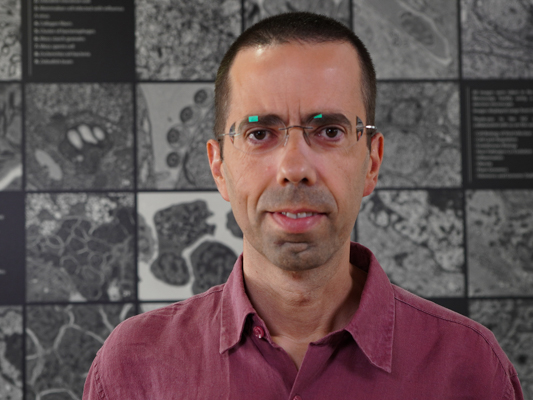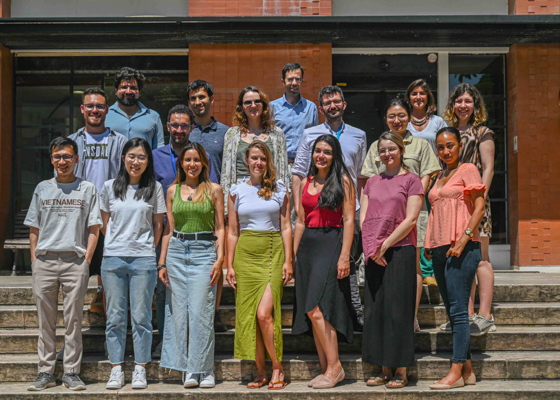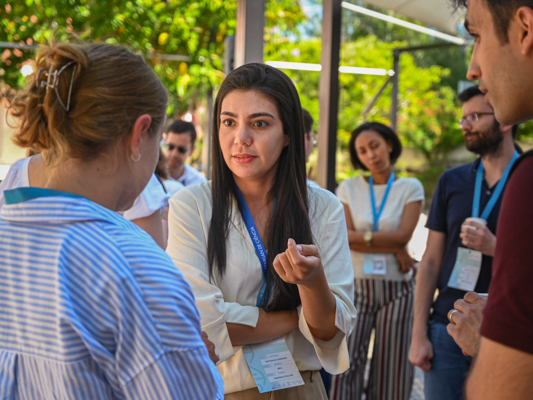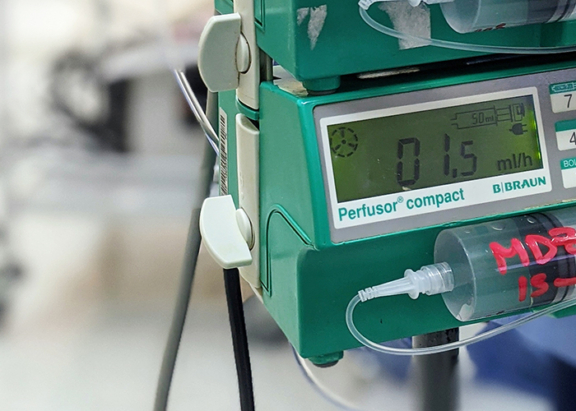
Innate Immunity and Inflammation
Luís Moita
The Innate immunity and inflammation laboratory works on two different topics: innate immunity and inflammation. Their focus on innate immunity is centered on the study of antigen cross-presentation mechanisms and the immunobiology of dendritic cells.
Effective immune responses against tumor antigens that are not endogenously expressed by dendritic cells (DCs) and against viruses that do not infect antigen presenting cells (APCs) require extracellular antigens to stimulate CD8+ T cells via the MHC I pathway through a process poorly characterized at the molecular level known as antigen cross-presentation.
Researchers are using a series of systematic genetic approaches to identify the molecular machinery involved in antigen cross-presentation. In addition, we want to explore antigen cross-presentation as an early immune-regulatory checkpoint in the control of CD8+ T cell priming by dendritic cells, to find drugs that inhibit negative regulators of this process, as they are likely to improve the generation of effective T cells responses against tumors and are good candidates for novel adjuvant therapies for cancer treatment.
The second theme of the laboratory relates to inflammation.
Severe sepsis remains a poorly understood systemic inflammatory condition with high mortality rates and limited therapeutic options outside of infection control and organ support measures.
Based on their recent discovery in mice showing that anthracycline drugs prevent organ failure without affecting the bacterial burden in a model of severe sepsis, we propose that strategies aimed at target organ protection have extraordinary potential for the treatment of sepsis and possibly for other inflammation-driven conditions.
However, the mechanisms of organ protection and disease tolerance are either unknown or poorly characterized.
The central goal of this research program is to identify and characterize novel cytoprotective mechanisms, with a focus on DNA damage response dependent protection activated by anthracyclines as a window into stress-induced genetic programs leading to tissue protection.
Funding

Publications
- Angelo Ferreira Chora, Dora Pedroso, Eleni Kyriakou, Nadja Pejanovic, Henrique Colaço, Raffaella Gozzelino, André Barros, Katharina Willmann, Tiago Velho, Catarina F Moita , Isa Santos, Pedro Pereira, Silvia Carvalho, Filipa Batalha Martins, João A Ferreira, Sérgio Fernandes de Almeida, Vladimir Benes , Josef Anrather , Sebastian Weis, Miguel P Soares, Arie Geerlof , Jacques Neefjes, Michael Sattler, Ana C Messias, Ana Neves-Costa, Luis Ferreira Moita (2022) DNA damage independent inhibition of NF-κB transcription by anthracyclines. eLife 11:e77443
- Tiago R. Velho and Ricardo Ferreira et al (2022) Role of Omega-6 Fatty Acid Metabolism in Cardiac Surgery Postoperative Bleeding Risk. Critical Care Explorations 4 (10)
- Colaço H. G., Barros, A. , Neves-Costa A.; Seixas E., Pedroso D., Velho T., Willmann K.L., Faisca P., Grabmann G., Yi H., Shong M., Benes V., Weis S., Köcher T. and Moita L.F. (2020) Tetracycline Antibiotics Induce Host-Dependent Disease Tolerance to Infection. Immunity 53:1–15
- Soares, M.P., Teixeira, L., Moita, L.F. (2017) Disease tolerance and immunity in host protection against infection.. Nat Rev Immunol. 17(2):83-96
- Colaço, H.G., Moita, L.F. (2016) Initiation of innate immune responses by surveillance of homeostasis perturbations.. FEBS J DOI 10.1111/febs.13730
- Acton, S.E., Farrugia, A.J., Astarita, J.L., Mourão-Sá, D., Jenkins, R.P., Nye, E., Hooper, S., van Blijswijk, J., Rogers, N.C., Snelgrove, K.J., Rosewell, I., Moita, L.F. , Stamp, G., Turley, S.J., Sahai, E., Reis e Sousa, C. (2014) Dendritic cells control fibroblastic reticular network tension and lymph node expansion.. Nature 514(7523):498-502
- Figueiredo, N., Chora, A., Raquel, H., (…), Baltimore, D., Gupta, V., Green, D.R., Ferreira, J.A., Moita, L.F. (2013) Anthracyclines Induce DNA Damage Response-Mediated Protection against Severe Sepsis. Immunity doi:pii: S1074-7613(13)00465-2
- Cebrian, I., Visentin, G., Blanchard, N., Jouve, M., Bobard, A., Moita, C., Enninga, J., Moita, L.F. , Amigorena, S., Savina, A. (2011) Sec22b regulates phagosomal maturation and antigen crosspresentation by dendritic cells. Cell 147(6):1355-68
- Ostrowski, M., Carmo, N.B., Krumeich, S., Fanget, I., Raposo, G., Savina, A., Moita, C.F., Schauer, K., Hume, A.N., Freitas, R.P., Goud, B., Benaroch, P., Hacohen, N., Fukuda, M., Desnos, C., Seabra, M.C., Darchen, F., Amigorena, S., Moita, L.F. *, Thery C*. *Corresponding authors. (2009) Rab27a and Rab27b control different steps of the exosome secretion pathway. Nat Cell Biol 12(1):19-30;sup pp 1-13
- Savina, A., Peres, A., Cebrian, I., Carmo, N., Moita, C., Hacohen, N., Moita, L.F. , Amigorena, S. (2009) Rac2 controls phagosomal alkalinization and crosspresentation selectively in CD8+ dendritic cells. Immunity 30(4):544-55
- Oberdoerffer, S., Moita, L.F. , Neems, D., Freitas, R.P., Hacohen, N., Rao, A. (2008) Regulation of CD45 alternative splicing by heterogeneous ribonucleoprotein, hnRNPLL. Science 321(5889):686-91
- Moita, L.F. *, Wang-Sattler, R., Michel, K., Zimmermann, T., Blandin, S., Levashina, E.A., Kafatos, F.C. *Corresponding author (2005) In vivo phagocytic screen in A. gambiae: new players and conserved pathways of engulfment. Immunity 23(1):65-73
- Levashina, E.A*., Moita, L.F. *, Blandin, S., Vriend, G., Lagueux, M., Kafatos, F.C.*These authors contributed equally to this work. (2001) Conserved role of a complement-like protein in phagocytosis revealed by dsRNA knockout in cultured cells of the mosquito, Anopheles gambiae.. Cell 104(5):709-18



